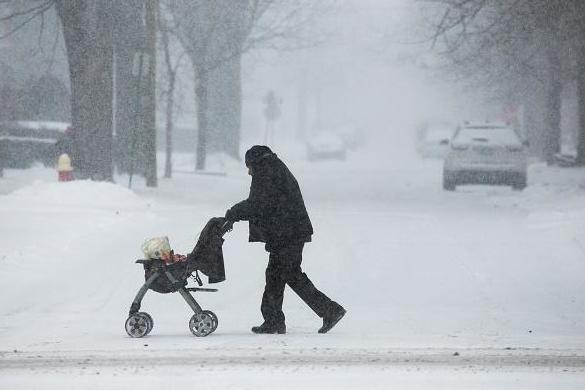US weather: Arctic blast could break 200 records as historic 'Siberian express' brings cold front
Winter storm warnings in effect as some parts of the country may face up to a foot of snow

Your support helps us to tell the story
From reproductive rights to climate change to Big Tech, The Independent is on the ground when the story is developing. Whether it's investigating the financials of Elon Musk's pro-Trump PAC or producing our latest documentary, 'The A Word', which shines a light on the American women fighting for reproductive rights, we know how important it is to parse out the facts from the messaging.
At such a critical moment in US history, we need reporters on the ground. Your donation allows us to keep sending journalists to speak to both sides of the story.
The Independent is trusted by Americans across the entire political spectrum. And unlike many other quality news outlets, we choose not to lock Americans out of our reporting and analysis with paywalls. We believe quality journalism should be available to everyone, paid for by those who can afford it.
Your support makes all the difference.An Arctic blast sweeping across the eastern United States was expected to bring below-freezing temperatures and as many as 200 record lows throughout the week, according to the National Weather Service.
The unusually cold air mass came from Siberia — a phenomenon called “Siberian Express” — and was predicted to bring historic low temperatures from the Great Plains to the Gulf Coast beginning on Monday and lasting until Wednesday night.
The cold front rolled through the upper Midwest on Sunday before heading south towards Texas, where forecasters said temperatures would fall nearly 30 degrees Fahrenheit (17 degrees Celsius) below typical November averages by Tuesday morning.
Record lows would then be felt from the Gulf Coast to Chicago, according to the National Weather Service’s digital forecast database.
Ice and severe weather conditions were also expected in several states on Monday, the National Weather Service reported, with some parts of northern Michigan possibly facing an entire foot of snow.
A winter storm warning was issued across the state’s Thumb region, with weather advisories in effect across Huron, Sanilac and St Claier counties on Monday and Tuesday.
The weather service’s Weather Prediction Centre tweeted on Monday morning that the nation’s cold spot was located in Malta, Montana, where the temperature sat at -24 degrees Fahrenheit (-31 degrees Celsius).
The centre said earlier that 148 daily record lows were forecast “to be broken, tied, or come within 1 degree between Tuesday and Thursday this week,” while National Weather Service meteorologist Kevin Donofrio told the Associated Press that some 200 records may be broken this week nationwide.
The January-like temperatures are far from common at this time of year in the southeastern US, though it’s not the first time a Siberian Express brought historic lows to the country.
The term was reportedly first coined during the January 1982 cold front with air from Siberian origins, which brought record-lows to many parts of the country.
Join our commenting forum
Join thought-provoking conversations, follow other Independent readers and see their replies
Comments